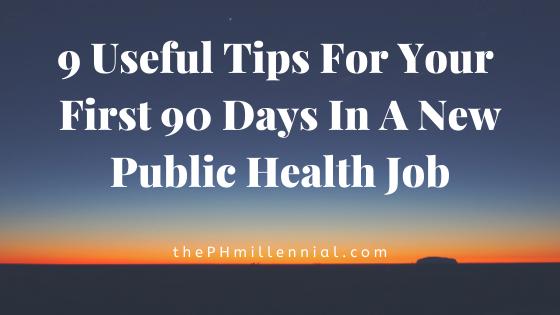You have been crushing it at the 30 day mark; now here are X useful tips for your first 90 days in a new public health job.
Last week I made a post on 8 Useful Tips For Your First 30 Days In A New Public Health Job. Today I’ll be talking about what to do after your first 90 days.
The 90 day mark of a job is usually when you get a performance review to see if you are doing the job correctly. Sometimes this is formal, other times it is not. At the end of the day you want to take the onus on yourself to set yourself up for success in the first 90 days and beyond.
These 9 tips will help you have a better 90 day transition into your new role.
Support The Public Health Millennial on BuyMeACoffee
1. Set Goals
In your first 90 days, you will want to set goals that you can accomplish by your 90 day mark. Try to those small wins in your first 90 days.
Apart from this, you should be setting goals for yourself for the year mark of your new job. Setting goals will enable you to align your actions with what is most pressing and important. Additionally, many jobs you will be setting goals after your first 90 days. However, you’ll want to have your own set of personal goals that you want to accomplish.
Remember what isn’t measured can’t be improved. Set yourself some goals – if possible make them SMART.
2. Establish Priorities & Action Steps
While the first thing you should concentrate on in setting your goals for you 90 days or one year mark, your next focus should be on establishing priorities and action steps.
Establishing priorities to know either which goals/projects are most needed or the time you need to allocate to those specific projects. This will help save you mental energy when you feel your stuck in your initial task. Find out what’s most important, calculate how much time it’ll take and set aside the time to get the work done.
Your action steps should be the daily, weekly, monthly, quarterly steps to get you to achieving your goals and priorities. The more micro you are able to make your action steps the less friction is takes to get the step done.
3. Find Professional Development Opportunities
So you’ve been in your new role for a couple of weeks or months, now it’s time to continue developing yourself. Professional development opportunities are essential especially for younger public health professionals. As we all know in public health, continual learning is a must so you should start to plan out these opportunities in your first 90 days.
Look up what state wide organizations host professional development opportunities. Are there skills you need to improve on? Professional development can also be a huge part of growing your professional network. By putting yourself in professional development spaces you are more likely to connect with likeminded individuals.
Find spaces where you can find professional development. This can be conferences, continuing education credits, skills based training, masterminds, and happy hours, to name a few.
4. Start Building Your Network
You’ve been in your job a couple weeks now and you are starting to get the hang of the role. Now it’s time to branch out and start building your network. It’s always a good idea to start building your network through the coworkers you have and other organizations you interact with frequently.
Building your network can look like you increasing your LinkedIn connections. Or it could mean making time to meet people outside your immediate circle to see how you all can share and collaborate off of one another. Your network will be important for your continuation in your career so be sure to be intentional throughout this process. Connect with people in your field or where you could see yourself transitioning too.
You’ll want to build your network up, down, and across! Connect to those ahead of you, behind you and in similar positions as you.
Heck join The Public Health Millennials LinkedIn Group (I promise to be more active)!
5. Embrace The Team
Now that you are beginning to become a part of your new team – embrace it! Through the notes you’ve taken, as I mentioned in last week’s post.
You are going to better understand the quirks and how to work with your team as you continue to spend time in your new organization. Embrace what different people like and don’t like. This is the family outside of the family. The people working together to push work forward. Embrace and make the most out of your team. Lean on them for information you don’t know and on how to best navigate your new role.
You are going to be spending a lot of time with your team, so it is in your best interest to make those connections real and work with these individuals as much as possible.
6. Challenge Yourself
Now you’ve been in your role for a couple weeks. You set your goals, set your priorities and wrote out each action step.
Before you move on towards completing those goals, ask yourself, “Are these goals ambitious enough?” If your answer is no, then set more ambitious goals for yourself. You will want to challenge yourself. It is only through discomfort that we are able to grow. Set ambitious goals and work towards them daily – refine your goals as necessary.
Though you may not always achieve challenging goals, the point is that you tried to. This means that you put in more effort than you would have otherwise. Being able to stretch yourself in this way will enable you to do much more than you once imagined. This process of setting high bars to hit and applying yourself is truly where the best personal and professional growth takes place.
7. Start to Set Boundaries
You have spent the last few weeks working how everyone else does. You may have done things that are outside of your boundaries – like taking on more work than needed or coming in earlier than normal. This is normal to want to go above and beyond when you begin a new job, however continuing to do this may lead to burnout.
Take this time to start to reestablish your boundaries. Of course, talk to your boss if this is necessary! Use your time as best you know to complete your goals. Continue to take on occasional “outside boundary” task to be team player.
This should help you to be more focused in your role.
8. Make Recommendations/Speak Up
Now that you are a part of the team, it’s time to contribute to the team. You were hired because of your knowledge, skillset, and brain just in general. Therefore, in those first 90 days try your best to bring your original ideas to the table.
You were hired for you, so bring you to the work. Make recommendations from you knowledge. Speak up in meetings to make sure that your point is being considered. Ask questions to help clarify information, do more research, and come with your ideas.
The sooner that you are able to take fully charge of your role by speaking up, the better. Make sure that you are taking time to learn and see how best you can contribute your knowledge and skillet to the overall team. You have a voice, use it.
9. Over-prepare
Over-prepare in your first 90 days at the new public health job. This is especially true for those of us that are young professionals. You are going to be the youngest in the room many a times. Thus it is on you to bring your best self to work every time you show up.
You are going to want to make sure that you are prepared or even over prepared in your first 90 days. When submitting your work – double check it. Read the old reports, analyze the current data, learn the trends, just go above and beyond to get the best context of the work.
In addition, you should own up to any mistakes that you have made. Mistakes aren’t the end all, use them as learning experiences to level up.
Bonus
Contribute to Company Culture
You are now part of the team (or soon to be right)! Now you can slowly check the company’s culture and try to introduce some things that you would like seen. Maybe this is a casual Friday, setting up wellness meetings, having lunch with colleagues a couple days a week, etc.
The team and company culture is going to shift if you contribute to it. This is going to be your work home for a while, why not make it a little bit more “for you” – you are sure to enjoy it more this way.
Make Meetings Count
You are beginning to understand what it takes to do your role. One thing you can always do to maximize your role would be to make sure that you are making the most out of meetings.
Meetings can be used to better get to know people, but you should always aim to have productive meetings regardless. This can be done by ensuring that there is topic and agenda items to talk about prior to the meeting so everyone can stay on track. You could even go ahead and add timestamps to the meeting to help things go according to plan.
The key to any meeting outside of the agenda, is ensuring there is time for next steps.
Conclusion
Your first 90 days in your new job can be an exciting time and a time to make your place in the organization. Use these 9 useful tips to help navigate the most out of your first 90 days.
Here are the 9 tips:
- Set Goals
- Establish Priorities & Action Steps
- Find Professional Development Opportunities
- Start Building Your Network
- Embrace The Team
- Challenge Yourself
- Start to Set Boundaries
- Make Recommendations/Speak Up
- Over-prepare
Use these 9 tips to make the most out of your first 90 days of your new public health job.
What are you working on most in your first 90 days in your new public health job?



